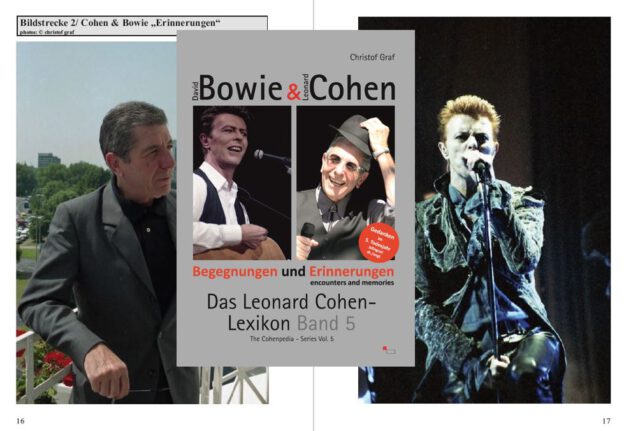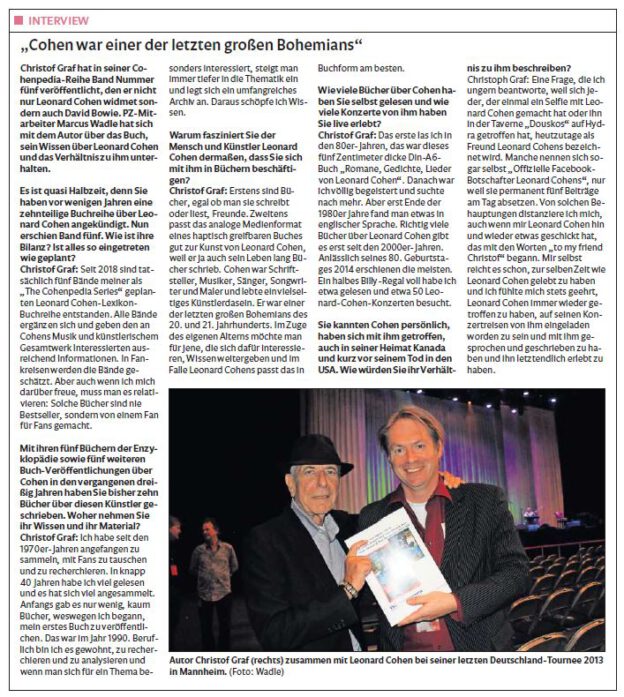 The author publishes excerpts at irregular intervals. The first edition of the Cohenpedia-series titled “Zen & Poesie”- Das Leonard Cohen – Lexicon –Vol.1” was released on April 6th, 2018. „David Bowie & Leonard Cohen – encounters & memories“ as Vol. 5 of “The Cohenpedia Series” is a book about thoghts in the fifth year of death of two legends and the art to turn mortality to music and the question of how David Bowie and Leonard Cohen musically faced death. 2016 was the year in which a surprising amount of artistic personalities of popular music passed away. With their respective albums, two of these artists, David Bowie and Leonard Cohen, confronted their own mortality and bade us farewell. 2021, five years later, the life and legacy of these distinguished personalities is still present, lingering on. Their music is still listened to, the analogous media still report on them and social media share the music, photos and stories of encounters and memories of Bowie & Cohen; they are unforgotten. I think it is not just five years after their death, I dare say that it will still be so in 50 years. A Beethoven is also still heard over 200 years after his death. Their musical works cannot be extinguished from the collective consciousness. Everyone who loves the music of „Bowie & Cohen“, and has encountered them at a concert, has their own stories and memories. „David Bowie & Leonard Cohen – encounters & memories“ – as volume 5 of „Zen & Poesie – The Cohenpedia-Series“ – documents a few of these memorable encounters of two unforgettable pop-culture personalities through word and image. This includes two conversations between the author and the artists, snapshots from the lives of „Bowie & Cohen“, concert accounts from their last tours and album reviews. The presented texts have been partially or fully released from 1990 to 2020. They were not overhauled and view themselves as momentary recordings of their time, as a memory of an encounter. To date, more than 400 mostly unpublished photos, as well as a timeline of both artists compliment the continuation of „Zen & Poesie- The Cohenpedia-Series“. An essay about the art of turning mortality into music and the answer to the question, how David Bowie and Leonard Cohen musically confronted death, complete the existing Volume Nr. 5. “Zen & Poesie – The Cohenpedia Series Vol. 5 – David Bowie & Leonard Cohen” is a type of supplement to Christof Graf`s book publications, newspaper and magazine releases, as well as radio shows about interviews with Leonard Cohen, but most of all an excerpt of his constantly “in progress” internet site “Cohenpedia,” (www.leonardcohen.de) and his blog (blog.leonardcohen.de).
The author publishes excerpts at irregular intervals. The first edition of the Cohenpedia-series titled “Zen & Poesie”- Das Leonard Cohen – Lexicon –Vol.1” was released on April 6th, 2018. „David Bowie & Leonard Cohen – encounters & memories“ as Vol. 5 of “The Cohenpedia Series” is a book about thoghts in the fifth year of death of two legends and the art to turn mortality to music and the question of how David Bowie and Leonard Cohen musically faced death. 2016 was the year in which a surprising amount of artistic personalities of popular music passed away. With their respective albums, two of these artists, David Bowie and Leonard Cohen, confronted their own mortality and bade us farewell. 2021, five years later, the life and legacy of these distinguished personalities is still present, lingering on. Their music is still listened to, the analogous media still report on them and social media share the music, photos and stories of encounters and memories of Bowie & Cohen; they are unforgotten. I think it is not just five years after their death, I dare say that it will still be so in 50 years. A Beethoven is also still heard over 200 years after his death. Their musical works cannot be extinguished from the collective consciousness. Everyone who loves the music of „Bowie & Cohen“, and has encountered them at a concert, has their own stories and memories. „David Bowie & Leonard Cohen – encounters & memories“ – as volume 5 of „Zen & Poesie – The Cohenpedia-Series“ – documents a few of these memorable encounters of two unforgettable pop-culture personalities through word and image. This includes two conversations between the author and the artists, snapshots from the lives of „Bowie & Cohen“, concert accounts from their last tours and album reviews. The presented texts have been partially or fully released from 1990 to 2020. They were not overhauled and view themselves as momentary recordings of their time, as a memory of an encounter. To date, more than 400 mostly unpublished photos, as well as a timeline of both artists compliment the continuation of „Zen & Poesie- The Cohenpedia-Series“. An essay about the art of turning mortality into music and the answer to the question, how David Bowie and Leonard Cohen musically confronted death, complete the existing Volume Nr. 5. “Zen & Poesie – The Cohenpedia Series Vol. 5 – David Bowie & Leonard Cohen” is a type of supplement to Christof Graf`s book publications, newspaper and magazine releases, as well as radio shows about interviews with Leonard Cohen, but most of all an excerpt of his constantly “in progress” internet site “Cohenpedia,” (www.leonardcohen.de) and his blog (blog.leonardcohen.de).













